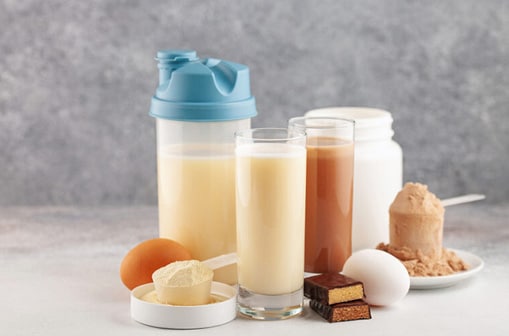
What Makes Dairy so Powerful?
What Makes Dairy so Powerful?
Dairy ingredients contain nutrients that cannot be synthesized by the human body, meaning that they are essential nutrients. Milk is a good to excellent source of 13 essential nutrients (protein (amino acidsSimple organic compounds that contain amino (-NH2 ) and carboyxl (-COOH) groups along with a side chain specific to each amino acid. There are approximately 500 amino acids in nature but only 20 are found in the human body. Amino acids chain together to form proteins.), vitamin A, vitamin B12, calcium, vitamin D, iodine, niacin (vitamin B3), pantothenic acid (vitamin B5), phosphorus, potassium, riboflavin (vitamin B2)Water soluble vitamin that gives whey its greenish color. More, selenium and zinc) and ingredients derived from milk contain varying levels of the nutrients. Including dairy ingredients in food and beverages improves the nutritional value of those products.
Dairy ingredients provide functionality in a variety of food and beverage applications, including but not limited to gelation, emulsification, viscosityResistance of a fluid to a change in shape or movement between layers of the fluid. Viscosity informally corresponds to the concept of “thickness”. More, water-binding, and whipping. While the unique acid-stable nature of whey proteinProtein in milk that remains in water phase after casein precipitates. More makes it suitable to low pHA measure of the acidity or alkalinity of a material. The pH scale ranges from 0 (acid) to 14 (alkaline) with 7 considered neutral. pH is a measure of the concentration of hydrogen ions and is defined as the negative log of the hydrogen ion concentration. More applications, the heat-stable nature of caseins makes it suitable to high-temperature applications. The fact that lactose is a reducing sugar, make lactose-containing ingredients appropriate for applications that benefit from browning (baked goods). Because milk fatsOrganic compounds that are combinations of alcohols and acids. Fats contain carbon, oxygen and hydrogen and have a glycerol backbone with fatty acids attached. Fats are not soluble in water but are soluble in organic solvents such as ether and alcohol. More melt near the body temperature of humans, dairy fatsOrganic compounds that are combinations of alcohols and acids. Fats contain carbon, oxygen and hydrogen and have a glycerol backbone with fatty acids attached. Fats are not soluble in water but are soluble in organic solvents such as ether and alcohol. More are suitable for a multitude of confections.

Proteins from Milk are Complete
Milk proteins (caseinProtein in milk that precipitates at pH 4.6. More and wheyLiquid obtained from cheese manufacture. More) deliver the nine essential amino acid nutrients that meet human requirements, making them both complete proteins. They are also high qualityFocus on doing things well and producing a product acceptable to consumers More proteins because they are efficiently digested and utilized by the body.
Many plant-based proteins only deliver some of these necessary nutrients, making them incomplete proteins. Also, anti-nutrient factors may be naturally present in some sources of plant-based protein (phytates in soy, for example), which may further decrease their protein qualityFocus on doing things well and producing a product acceptable to consumers More for humans.
How Your Body Processes Proteins from Milk
You may know that your body needs amino acidsSimple organic compounds that contain amino (-NH2 ) and carboyxl (-COOH) groups along with a side chain specific to each amino acid. There are approximately 500 amino acids in nature but only 20 are found in the human body. Amino acids chain together to form proteins., but did you know it needs them in a certain ratio? Proteins from milk deliver all nine essential amino acidsSimple organic compounds that contain amino (-NH2 ) and carboyxl (-COOH) groups along with a side chain specific to each amino acid. There are approximately 500 amino acids in nature but only 20 are found in the human body. Amino acids chain together to form proteins., in just the right ratio, along with a unique combination of bioactive peptides (some which have a role in lowering your blood pressure) and minor proteins that have natural antibacterial properties (to boost your immune health). That’s why proteins from milk are unbeatable when it comes to delivering the strong inside your body.
Proteins play critical roles in protein systesis, tissue repair, and other vital processes. CaseinProtein in milk that precipitates at pH 4.6. More gets digested and releases amino acidsSimple organic compounds that contain amino (-NH2 ) and carboyxl (-COOH) groups along with a side chain specific to each amino acid. There are approximately 500 amino acids in nature but only 20 are found in the human body. Amino acids chain together to form proteins. into the bloomstream slower than wheyLiquid obtained from cheese manufacture. More, maximizing the repair and rebuilding of our muscles, whereas wheyLiquid obtained from cheese manufacture. More gets digested and releases amino acidsSimple organic compounds that contain amino (-NH2 ) and carboyxl (-COOH) groups along with a side chain specific to each amino acid. There are approximately 500 amino acids in nature but only 20 are found in the human body. Amino acids chain together to form proteins. to the muscles more quickly, contributing to muscle mass and recovery.
For an Active Lifestyle
- Post-exercise inflammation
- Musculoskeletal recovery
- Hydration
For Longevity & and a Healthy Lifestyle
- Macronutritient Dense
- Musculoskeletal recovery
- Longevity
For Weight Management
- Macronutritient Dense
- Probiotics and gut biome
- Protein
Dairy's Sustainability Story is Simple
- Simple Processed Foods
- Clean Label
- Nutrient Dense

Beyond the Gram
Protein is a game of qualityFocus on doing things well and producing a product acceptable to consumers More and quantity. You may be getting the right number of grams of protein per meal or day, but if you’re not consuming proteins from milk, you may be missing out on real results like leaner body mass, sustained energy, and more muscle strength.
Even wheyLiquid obtained from cheese manufacture. More and plant protein combination blends have been found to be less effective than whey alone for muscle protein synthesis, for example. This has been shown to be true when tested with both pea and wheat proteins, even when given at a higher dose than wheyLiquid obtained from cheese manufacture. More proteins.1 2 Make sure you’re getting the most out of your protein by checking your ingredient labels for proteins from milk.
Other nutrients in milk should also not be overlooked. Approximately 50% of Americans do not consume adequate amounts of dairy foods (>3 servings a day) and subsequently consumer below recommended dietary intake for the critical nutrients calcium, magnesium, vitamin A, and vitamin D. (3)
1 Phillips, S. 2017. Current Concepts and Unresolved Questions in Dietary Protein Requirements and Supplements in Adults. Frontiers in Nutrition (4):13.
2 Mathia, JK, et al. 2017 Values for digestible indispensable amino acid scores (DIAAS) for some dairy and plant proteins may better describe protein quality than values calculated using the concept for protein digestibility-corrected amino acid scores (PDCCAS). Br J Nutri 117:490-499.
3 Hess JM, Cifelli CJ, Fulgoni III VL. Energy and Nutrient Intake of Americans according to Meeting Current Dairy Recommendations. Nutrients. 2020; 12(10):3006. doi: 10.3390/nu12103006

